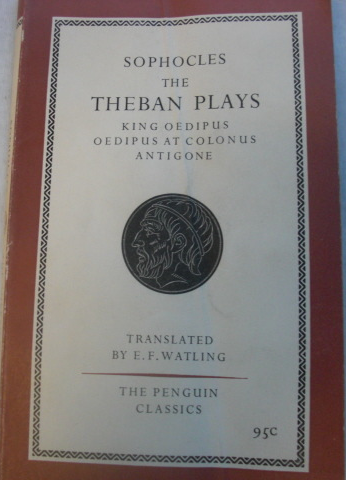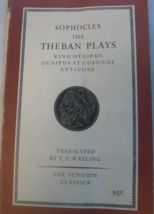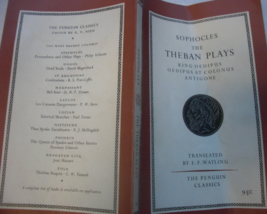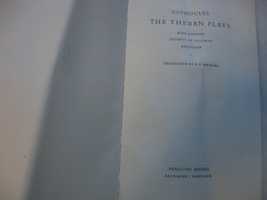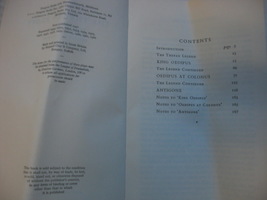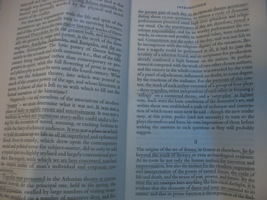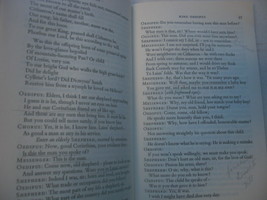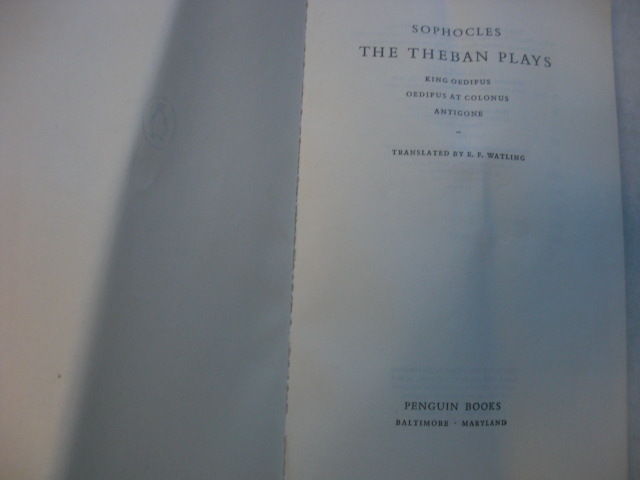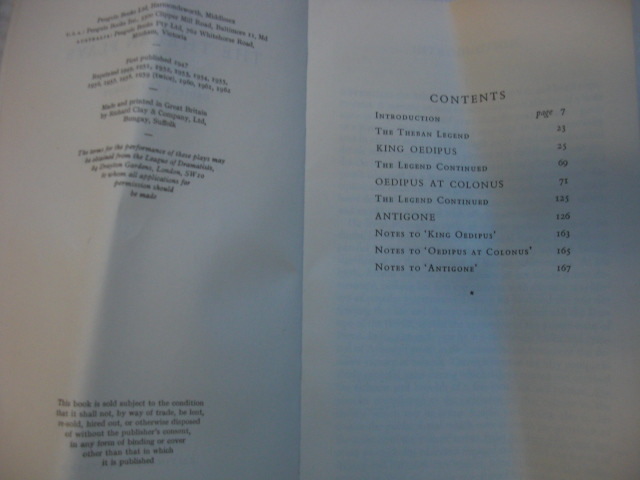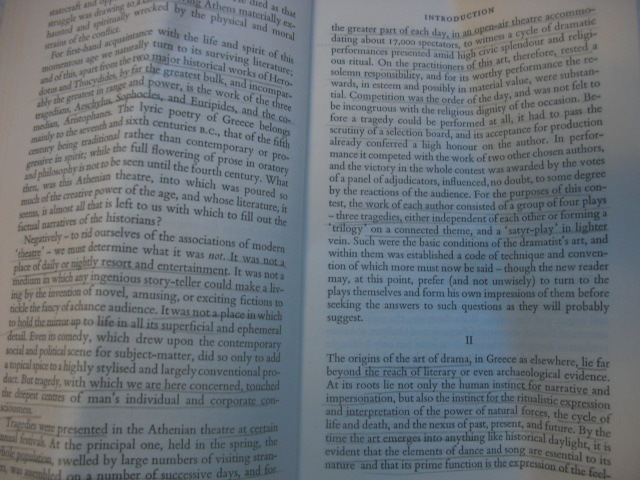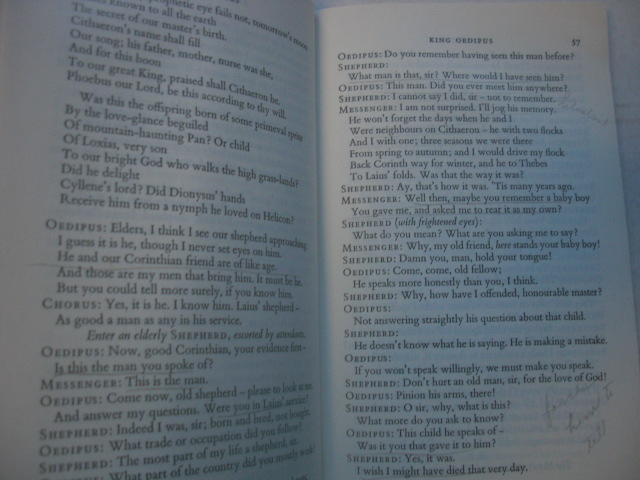Rendered at 17:54:34 05/10/25
Free Shipping
Sophocles The Theban Plays, King Oedipus, Oedipus at Colonus and Antigone: Trans
£33.90 GBP
Ships from
United States

Shipping options
FREE in United Kingdom
Ships from
United States

Return policy
Purchase protection
Payment options
PayPal accepted
PayPal Credit accepted
Venmo accepted
PayPal, MasterCard, Visa, Discover, and American Express accepted
Maestro accepted
Amazon Pay accepted
Nuvei accepted
Shipping options
FREE in United Kingdom
Ships from
United States

Return policy
Purchase protection
Payment options
PayPal accepted
PayPal Credit accepted
Venmo accepted
PayPal, MasterCard, Visa, Discover, and American Express accepted
Maestro accepted
Amazon Pay accepted
Nuvei accepted
Item traits
| Category: | |
|---|---|
| Quantity Available: |
Only one in stock, order soon |
| Condition: |
Acceptable |
| Special Attributes: |
Vintage Paperback |
| Author: |
Sophocles, translator Watling |
| Book Title: | |
| Language: |
English |
| Topic: |
Greek Drama |
| Format: |
Paperback |
| Publisher: |
Penguin Books |
| Genre: |
Theban Plays |
| Publication Year: |
1962 |
| Original Language: |
Greek |
| Narrative Type: |
Fiction |
| Type: |
Fiction |
| Country/Region of Manufacture: |
United States |
| Edition: |
unknown |
| Intended Audience: |
Adults, Young Adults |
| Vintage: |
Yes |
| Number of Pages: |
162 |
Listing details
| Shipping discount: |
Seller pays shipping for this item. |
|---|---|
| Price discount: |
10% off w/ $100.00 spent |
| Posted for sale: |
More than a week ago |
| Item number: |
1373081436 |
Item description
Oedipus at Colonus (also Oedipus Coloneus; Ancient Greek: ???????? ??? ??????, Oidipous epi Kol?n?i) is the last of the three Theban plays of the Athenian tragedian Sophocles. It was written shortly before Sophocles's death in 406 BC and produced by his grandson (also called Sophocles) at the Festival of Dionysus in 401 BC.
In the timeline of the plays, the events of Oedipus at Colonus occur after Oedipus Rex and before Antigone; however, it was the last of Sophocles's three Theban plays to be written. The play describes the end of Oedipus's tragic life. Legends differ as to the site of Oedipus's death; Sophocles set the place at Colonus, a village near Athens and also Sophocles's own birthplace, where the blinded Oedipus has come with his daughters Antigone and Ismene as suppliants of the Erinyes and of Theseus, the king of Athens.
Plot: Led by Antigone, Oedipus enters the village of Colonus and sits down on a stone. They are approached by a villager, who demands that they leave, because that ground is sacred to the Furies, or the Erinyes. Oedipus recognizes this as a sign, for when he received the prophecy that he would kill his father and marry his mother, Apollo also revealed to him that at the end of his life he would die at a place sacred to the Furies and be a blessing for the land in which he is buried.
The chorus, consisting of old men from the village, enters and persuades Oedipus to leave the holy ground. They then question him about his identity and are horrified to learn that he is the son of Laius. Although they promised not to harm Oedipus, they wish to expel him from their city, fearing that he will curse it. Oedipus answers by explaining that he is not morally responsible for his crimes, since he killed his father in self-defense. Furthermore, he asks to see their king, Theseus, saying, "I come as someone sacred, someone filled with piety and power, bearing a great gift for all your people."[1]:?300? The chorus is amazed and decides to reserve their judgment of Oedipus until Theseus, king of Athens, arrives.
Ismene arrives on horseback, rejoicing to see her father and sister. She brings the news that Eteocles has seized the throne of Thebes from his elder brother, Polynices, while Polynices is gathering support from the Argives to attack the city. Both sons have heard from an oracle that the outcome of the conflict will depend on where their father is buried. Ismene tells her father that it is Creon's plan to come for him and bury him at the border of Thebes, without proper burial rites, so that the power which the oracle says his grave will have will not be granted to any other land. Hearing this, Oedipus curses both of his sons for not treating him well, contrasting them with his devoted daughters. He pledges allegiance with neither of his feuding sons, but with the people of Colonus, who thus far have treated him well, and further asks them for protection from Creon.
Because Oedipus trespassed on the holy ground of the Eumenides, the villagers tell him that he must perform certain rites to appease them. Ismene volunteers to go perform them for him and departs, while Antigone remains with Oedipus. Meanwhile, the chorus questions Oedipus once more, desiring to know the details of his incest and patricide. After he relates his sorrowful story to them, Theseus enters, and in contrast to the prying chorus states, "I know all about you, son of Laius."[1]:?318?He sympathizes with Oedipus and offers him unconditional aid, causing Oedipus to praise Theseus and offer him the gift of his burial site, which will ensure victory in a future conflict with Thebes. Theseus protests, saying that the two cities are friendly, and Oedipus responds with what is perhaps the most famous speech in the play. "Oh Theseus, dear friend, only the gods can never age, the gods can never die. All else in the world almighty Time obliterates, crushes all to nothing..."[1]:?322?Theseus makes Oedipus a citizen of Athens and leaves the chorus to guard him as he departs. The chorus sings about the glory and beauty of Athens.
Added to your wish list!
Get an item reminder
We'll email you a link to your item now and follow up with a single reminder (if you'd like one). That's it! No spam, no hassle.
Already have an account?
Log in and add this item to your wish list.


